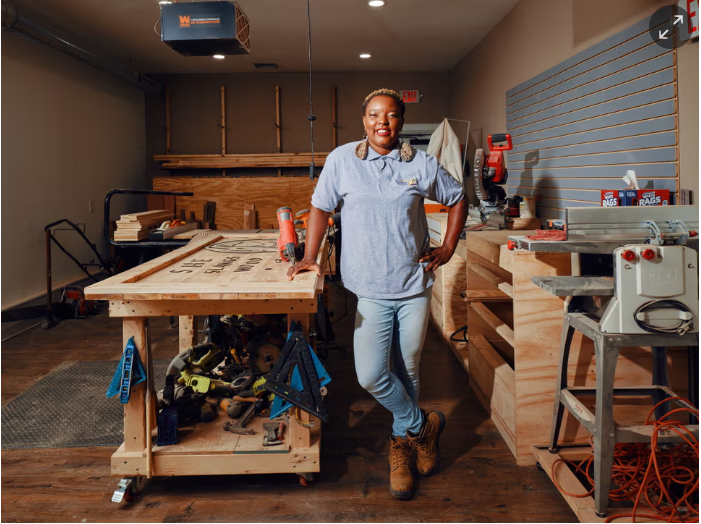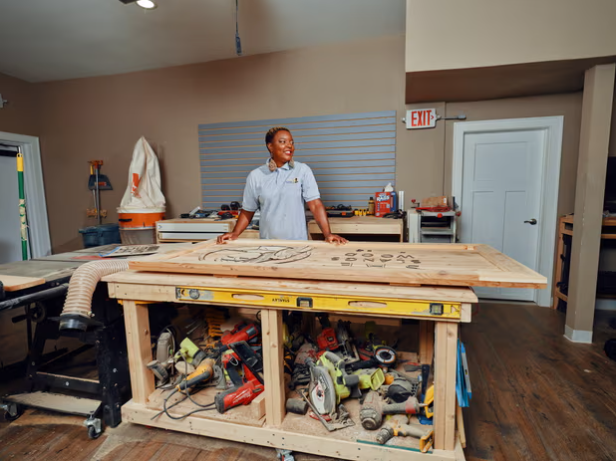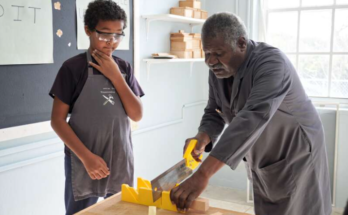Tonda Thompson began her journey by fixing up her own furniture, and today, she’s built such a reputation that her services are in high demand—her waitlist is now an impressive six months long!

Tonda Thompson of She Slangs Wood, in Milwaukee, Wisconsin, earlier this month. Photograph: Caleb Alvarado/The Guardian
If it weren’t for Mickey Mouse, Tonda Thompson might never have discovered her passion for carpentry. It all started during the early days of the pandemic, when her then two-year-old son was joyfully reenacting Mickey’s hotdog dance on the living room coffee table—until the table gave way under the weight of his energetic performance. Tonda was ready to head to Target for a replacement when it hit her: another flimsy table would only meet the same fate. Inspired by a friend who had recently taken up woodworking, Tonda decided to try her hand at building something sturdy herself. She grabbed some two-by-fours from Home Depot, found plans online, and watched YouTube tutorials, diving headfirst into crafting a custom coffee table in her basement.
Thompson was so pleased with her first creation that she shared a photo of it on Facebook. Within weeks, 10 friends and family members reached out to order their own. “It took me most of the summer to make those 10 tables,” said Thompson, 36. “Now, I could build each one in under two hours.”
Driven by a desire to improve, Thompson took on the challenge of mastering a friend’s castoff bandsaw and circular saw. As her skills grew, so did her designs. What began with simple tables and charcuterie boards soon expanded into more intricate projects, like modular picnic tables that double as benches. “When people challenge me, I think, ‘I could make that.’ It’s a flex to push my creativity and see what I can create,” she explained.
When the racial justice movement surged in the summer of 2020 following the killing of George Floyd, Thompson chose to spend her time making tables in her garage instead of protesting in the streets. “I was at a point in my life where I just wanted to heal,” she explained.
By the end of 2020, Thompson realized she had built more than just a hobby—she had a business. She officially launched She Slangs Wood, and after making an appearance on The Kelly Clarkson Show in 2021, orders for her charcuterie boards came flooding in. With the success of her business, she earned enough to put a down payment on a vacant three-story building in Milwaukee, investing over $500,000 in renovations through various grants and loans. “This corner used to be known for drug activity, and we’ve completely changed the vibe of the neighborhood into something more positive,” she said.
In August, Thompson opened a She Slangs Wood retail store on the main floor, with a wood shop in the back. The second floor is rented to tenants in the community health field, including her own non-profit, the National Coalition for Healthy Black Families. Her ultimate vision? To create a community hub where people can learn everything from carpentry to home economics. “It’s a safe space where people can come to thrive,” she said.

Tonda Thompson got a start with woodworking when she started to build her own furniture. Photograph: Caleb Alvarado/The Guardian
In addition to running She Slangs Wood, Thompson also leads the National Coalition for Healthy Black Families and manages a media company called Vogue Dreams. So, how does she juggle it all?
For Thompson, everything ties back to her passion for uplifting communities and creating spaces for healing and growth. She views She Slangs Wood not just as a business, but as a tool for empowerment—providing jobs, fostering creativity, and revitalizing neighborhoods. Meanwhile, the National Coalition for Healthy Black Families focuses on improving health outcomes for Black communities, something that aligns deeply with Thompson’s core values.
As for Vogue Dreams, the media company allows Thompson to use storytelling and creative content to amplify the voices of marginalized communities, adding another layer to her mission of positive change. While each venture might seem distinct, they all serve a common goal: to build a stronger, more supportive environment where people can thrive. It’s about combining business, activism, and creativity to leave a lasting impact.
It sounds like you’re juggling a lot right now! It’s completely understandable to have days where things don’t go as planned, especially when the workload feels heavy. Taking it one day at a time is a smart approach—sometimes the key is not to get overwhelmed by the bigger picture. It’s great that you’ve identified woodworking as something therapeutic, but I can see how it could easily take over! That 4pm cutoff is a good way to keep things in check. Have you found any specific ways to make your breaks feel more refreshing, like a walk or something else that helps reset your mind?
For many, working with wood can be incredibly therapeutic because it allows for a deep sense of focus and presence. The tactile nature of working with wood—feeling the grain, shaping it, and seeing your progress—can be very grounding. It’s a process where you can leave distractions behind and get lost in the rhythm of the task at hand. Plus, the results are tangible and rewarding; you can step back and admire something you’ve built with your hands, which brings a sense of accomplishment and pride.
What do you enjoy most about working with wood? Is it the creative aspect, the problem-solving, or something else?
It all starts with the smell. There’s something about the scent of wood that instantly transports you to a place of comfort and warmth, filling the air with a sense of safety and love. Then, there’s the satisfaction of working with your hands—there’s nothing quite like it. After crafting a table, the real joy comes in the sanding. The rhythmic motion of smoothing the wood brings a soothing calm to your body, creating a peaceful, meditative state for your mind.
Managing the growing demand is definitely a challenge, especially as the sole employee. “I build, build, and build but I can never keep up with the orders,” Thompson says. It’s a constant balancing act, reminding herself that she’s not a machine. The next step is scaling up, which means learning to delegate and hire a team. However, finding people who share her passion and vision for the craft is no easy task. It’s a journey of growth, but the goal is to build a team that can match the energy and dedication she’s put into her work.
The waitlist for one of her bestsellers, the Africa table, is at least six months long. Most of Thompson’s clients are understanding when she explains that it will take time to fulfill their orders. The demand reflects the quality and uniqueness of her work, but it also highlights the challenge of balancing orders with the personal touch she brings to each piece.
What does the future look like for She Slangs Wood?
“It’s taken me three years to get this space open, and now I already feel like I need a bigger space to keep up with production. My goal for She Slangs Wood is to become a nationally recognized brand—something like Ashley’s Furniture. I want us to be the go-to destination when you need anything made from wood, whether it’s a cutting board, a table, a fence, or even a deck or porch.”
What’s a piece of advice you wish you would have received before starting a business?
“Treat your business like it’s your baby. Don’t just let anyone take care of it. You need to love it, protect it, and nurture it. Also, understand every aspect of your business and be patient. Things don’t happen overnight. It’s all about building it, brick by brick.”
It seems like we’re up against a range of challenges in today’s world—from bad actors spreading disinformation to powerful lobby groups trying to manipulate the truth. But there’s something incredibly inspiring about someone like Thompson, who’s building something grounded in authenticity and passion, despite the broader obstacles. What’s your take on how we can push forward in a world filled with these challenges?
But we have something powerful on our side.
We’ve got you.
That’s why we’re inviting you to join us and access our exceptional, investigative journalism with exclusive digital extras to unlock:
- Unlimited articles in our app
- Ad-free reading across all your devices
- An exclusive weekly newsletter straight from the Guardian newsroom
- Fewer asks for support
- Full access to the Guardian Feast app
The Guardian is powered by readers like you, including those in Cambodia, and the only person who decides what we publish is our editor.
If you can, please consider supporting us with a monthly contribution. It takes less than a minute to set up, and you’ll be making a big impact in supporting open, independent journalism. Thank you!


